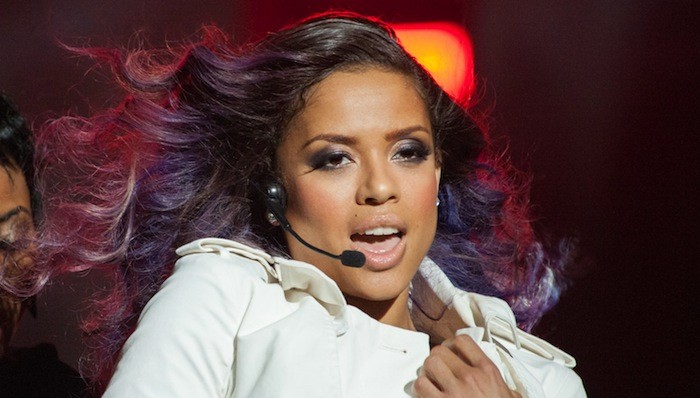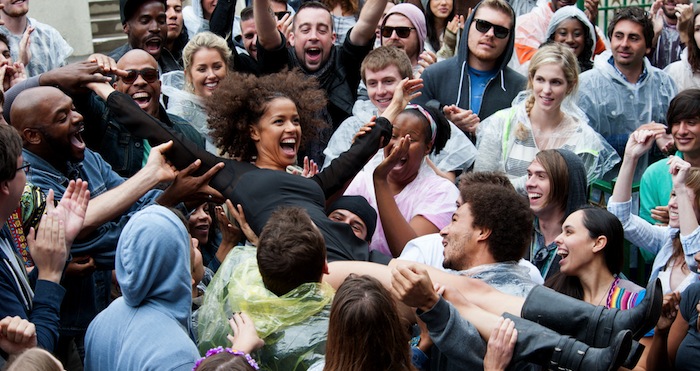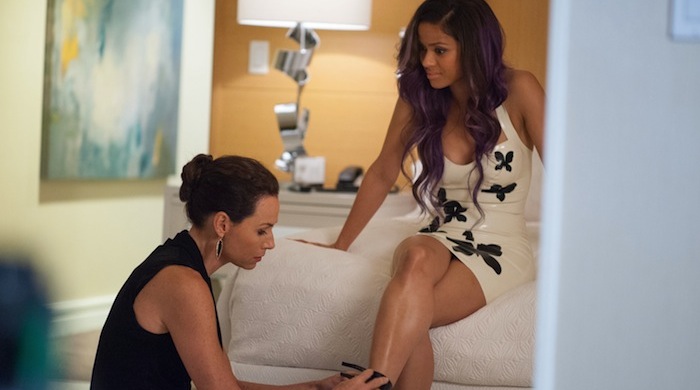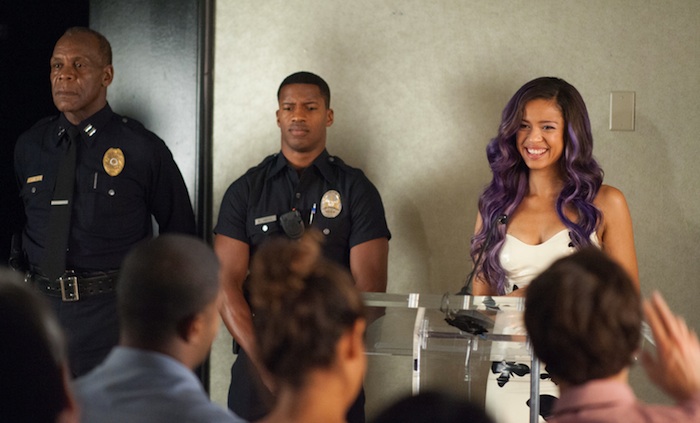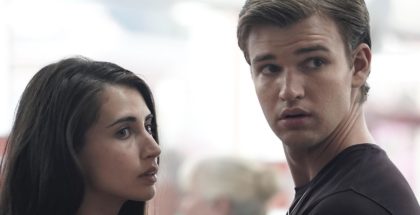Interview: Gina Prince-Bythewood (writer and director of Beyond the Lights)
Matthew Turner | On 04, Jul 2015
Gina Prince-Bythewood’s Oscar-nominated (and brilliant) Beyond the Lights headed straight to VOD – and then DVD – in the UK this week, following a premiere at the Edinburgh International Film Festival.
Why did it skip cinemas? Critic Simran Hans has highlighted the lack of black lives on British cinema screens, thanks to nervous distributors, who make assumptions about audience interests. Universal have attributed the decision to a range of other factors, including the “limited availability” of cast and crew for promotional duties.
Writer and director Gina, though, reveals that Universal weren’t prepared to pay to fly the film-makers over to UK to promote the film. So we picked up the phone ourselves and spoke to her exclusively about the distributor’s surprise decision to go digital, the sexualisation of female artists in the music industry and breaking down the artificial barrier of ‘Black Film’.
Congratulations on the film – it’s had a good reception in Edinburgh.
Oh good, good to hear. It sucks to be way out here and have no clue how it’s playing.
Where did the idea for the film come from?
It came from me wanting to do a love story and also a music film – some of my favourite movies are music films, like Lady Sings The Blues, The Rose, Walk The Line – but I didn’t know what the story was going to be. And it was actually one of those great moments as a writer: I was at an Alicia Keys concert and sitting in the crowd and listening and suddenly this character of Noni popped into my head and the story and I closed my eyes and just started picturing this movie, as she was singing, like she was on the soundtrack, so that was really the genesis of it.
As well as the music films you mentioned, did you watch any movies in preparation?
Absolutely. The Rose was a big influence on this film. I watched a lot. I watched pretty much everything – Purple Rain, Walk the Line, Coal Miner’s Daughter and it was interesting, because once I cast Gugu, she was not familiar with a lot of those music films, so I gave her a stack of DVDs to go through as well.
What did you and Gugu take away from that research?
You know, it’s really about really driving into her what music feels like, the bigness of it, the emotion of it, you know, in the great music films, the music fuels the story and vice versa. But also, just in terms of the performance, Gugu is an actress, she’s not a singer. Although she became one for this film, that was a tremendous amount of work and in watching those films she got to see the work that lots of other actors put into becoming a real artist for a performance.
Minnie Driver is great casting in that sense because she’s had her own brushes with the music industry.
Absolutely and when I cast her – she came aboard a week before filming, it was very scary that I didn’t have her cast up until that point – it was an immediate thing, when she came into the room to meet with me, her connection to the material, being an artist herself. I didn’t know before going in her authentic connection to black culture, in that she grew up in Barbados when she was younger and also just her connection to pop culture today and being really in tune with what’s going on with female artists.
How was the casting process for Gugu?
I thought, going in, that I wanted to cast a real singer for the part, just given all the singing in there and I wanted an authenticity for this film. But as I started meeting with different singers, they were auditioning and nothing was feeling right, and I realised that I needed an actor to be able to go for the depth of character, so I opened it up and started looking at actors. Gugu – this was two years ago, before she did Belle – she was suggested to me by my casting director, so I had her come in and it was so immediate, within two minutes of her reading, the shock of like, ‘This is Noni, this is the woman in my head’ and in the second half of the audition, she had to sing Nina Simone’s Blackbird and I was just praying that she could at least hold a note or have something I could build on, but she knocked it out and I knew, at that moment, that was my Noni. The issue was that she wasn’t a star, she was unknown and the studio that I was at said I couldn’t cast her. But as a director, your talent is in your choices and I knew in my gut that Gugu was right for the part, so we parted ways, the studio and I, and I started going to other studios, trying to get it set up again with Gugu in the lead. We kept getting turned down, really for that reason, just that she wasn’t a star and they didn’t want to bank millions of dollars on someone that was unproven. But, finally Relativity, which is a smaller studio, and BET as well, stepped up, recognised her talent and paid for the film.
“The reality is they weren’t going to fly any of us out there, they weren’t going to put up the money to do that…”
It must be very gratifying to see a star like Gugu, when she makes something like Belle and obviously, she’s much more up-and-coming now…
Absolutely. And the reviews for Gugu’s performance here – I mean, it wasn’t just she’s really good, it was universally lauded and it’s unfortunate that it happened too late. There was a large group of top critics who were really fighting for her to get an Oscar nomination, but as we know, if you don’t have that vote coming out early on, it’s pretty tough to break through. But it was a pretty big clamour, which was exciting for me. Also tough, because I believe that Gugu deserved it, but it was gratifying as well, knowing that what I saw, the rest of the world got to see.
You have Danny Glover in the film too. How did that come about?
Danny was on my vision board when I was writing the film, as someone I really wanted for that part. He has such a natural gravitas and warmth and depth and he was just perfect. And it’s interesting, because when you work with someone of that calibre, you never know what you’re going to get. Are they going to phone it in? Are they just taking it for the job? But I knew from the first meeting that he was invested, he really loved the father-son relationship, it’s not something we get to see in films very often, especially between Black men. He was very invested in putting that out there and great to have on set.
What was the hardest thing to get right, overall?
For a film like this, it’s all about authenticity and it was really making Gugu become a real artist. I think that would be the toughest thing, but also the most exciting thing. And I surrounded her with the absolute best in the industry: Her choreographer was Laurieann Gibson, who was the artistic director for Lady Gaga and Nicki Minaj. The-Dream did all of Noni’s original music and we obviously know how prolific he is, with working with Beyoncé and Rihanna and Shakira, you know, huge hits, so her working in the studio with him. Her hair person for the film is Kim Kimble, who does Beyoncé’s hair. Her make-up artist was Lauryn Hill’s make-up artist…
So it was really about surrounding her with the real people and it was six months of hardcore training to make her not just an actor playing an artist, but become an artist. So I think that was the hardest thing, but again, the most exciting thing, to see her transform. If you meet Gugu, Belle is much closer to who Gugu is in real life – she’s very reserved and quiet – but that she was able to bring out that hyper-sexual, aggressive persona that is Noni in the beginning of the film was really an incredible thing to watch.
Did Minnie bring any any of her own insights to her performance, given her experience?
Yes, absolutely. Minnie being an artist and the trouble that she’s had as a female artist as well, especially – I don’t know how much it is in the UK, but out here, there is definitely a blueprint that female artists need to follow, that is really coming out hyper-sexualised, to get noticed. And unfortunately, it works, but what happens then is that you’re trapped in that persona. And what does that do to you if that’s not authentic to you, because you have to wear it 24/7? She’s had her own struggles in terms of wanting to be a singer-songwriter and do a specific type of music and so she was able to bring that angst to both her character, which is a woman trying to find her own self-worth, but also being able to impart some of that to Gugu as well.
The film’s picked up great reviews, it’s had positive reactions at film festivals – what reasons were you given for the film going directly to VOD and bypassing UK cinemas?
It is so painful, because I was really looking forward to this film getting a theatrical release in the UK and Gugu was as well, that’s where she’s from and she was excited at people being able to see this performance and see this film. So we were all very surprised that it suddenly didn’t get a UK theatrical release. They gave the argument that because it didn’t blow up bigger over here – it still did well here, and again, great reviews and the Oscar nom – and given that half our cast are Brits, it just didn’t make sense, but that was the reason. And I know they’re saying that the cast and crew weren’t available for publicity, but the reality is they weren’t going to fly any of us out there, they weren’t going to put up the money to do that. So we were willing, absolutely, to talk about the film and we love the film, but they weren’t willing to step up and get us out there to do any press, so that was very disappointing and obviously, I’m sure when Gugu found out that it was then going straight to DVD, what’s the incentive for her to do a big press tour if it’s not even getting a theatrical release? So it’s a huge let-down for all of us, very, very disappointing, because I think it deserves it, not only the film, but Gugu’s and Minnie’s performances deserve to be seen as well.
“I really hate… the term ‘Black Film’, just because it’s not a genre and it’s a way for Hollywood to marginalize any film with a black person in it”
What are your hopes for the film going forward?
Well, the great thing about the film is the journalistic champions that we’ve had – I mean, it came out in November and there’s articles still being written about it and people pushing every different platform it comes on. At first, it was in theatres and then it came on iTunes and then the DVD release and now it just came out on Netflix [in the US], so it’s really that longevity that excites me as a filmmaker, that people continue to discover it and champion it and be moved by it. And that’s my hope in the UK too, that people discover the film. And I’m going to say that my biggest hope is that there’s enough groundswell where we’ll end up on some screens, because I feel it deserves to be seen on a big screen – it’s a music film, you want to feel that bigness of it. So that’s really my hope, a groundswell of support for the film and some of the articles that have been written for the film and what you put out as well, makes me hopeful and I’m grateful.
What do you hope audiences take away from the film?
Well I think, foremost, the theme of the film for me was ‘Choose Life’ and that is a message that it was important to me to put out, just given things that happened in my personal life that I put into the character and wanted to put into the world. But also just about inspiring people to be authentic to who they are. On a bigger, let’s say on a grander theme, for my work, being a black female, much of my work focuses on people of colour, but my hope is that I make films that do have people of colour in the lead, but they’re universal themes and that anybody can embrace those themes and those characters in the same way that I can go see The Notebook or Bridget Jones’ Diary and fall in love with those characters, even though they don’t look like me.
I want the same for my characters and so that’s what’s been encouraging as well, given, you know, premièring at Toronto which obviously was a predominantly white audience and getting a standing ovation and then being able to go to New York UrbanWorld Film Festival, which is predominantly black and getting a standing ovation, so all people being able to embrace the work and start to break down the barriers of, ‘This is a Black Film and only black folks will be interested in it’ – I don’t subscribe to that and I really hate that, the term ‘Black Film’, just because it’s not a genre and it’s a way for Hollywood to marginalise any film with a black person in it, that’s like saying 12 Years A Slave is the same thing as my film – they’re not, they’re two totally different genres, one’s a period drama, one’s a love story. I just really want to obliterate that term and just make films that everybody can embrace.
Do you have any particular influences as a director, in that sense? People who’ve maybe made that element of things work?
Huh. Honestly, I don’t think I do, I’m just attracted to different filmmakers who have a specific, unique voice like Kathryn Bigelow, Steven Soderbergh, Scorsese, people that are making films that are specific to them, yet they reach everyone. I mean, obviously, Scorsese tapped into his culture very strongly in his work, but makes it accessible to someone like me, who’s not Italian. So I love that, I love filmmakers that can be specific, but also universal.
You mentioned the film dropped on US Netflix just recently. What are your thoughts on the film being available on Netflix in one country but not in another?
Yes, it’s interesting. I mean, the only reason I would say that I’m happy it hasn’t hit Netflix UK yet is that I want the opportunity for the film to be seen on the big screen first and if it’s so readily available in your living room, you have no reason to wander out to the theatre. So that would be the only thing. I mean, I guess, in a perfect world, the film would be available to everyone at the same time, both theatrically and ultimately on DVD and Netflix, as opposed to staggered. I don’t quite understand that.
Are you a Netflix watcher yourself?
I’ve just gotten into Netflix, I would say about six months ago. It is a pretty phenomenal service, to be able to just open up your computer and start streaming a film. As a filmmaker, you want your film to be seen in the best possible light, which is foremost on a big screen and then second on a large flat screen, as opposed to the small computer screen or even, you know, people talk about watching my film on their phones. I’m glad they’re watching it, but God, I wish they could see and hear it in the way it was intended. But Netflix definitely makes access easier and as a filmmaker, ultimately you want your work to be seen, so if it makes it easier to be seen then so be it.
What have you been watching on Netflix recently?
Well, I’m obsessed with Orange Is The New Black. I love that show. I have a script due, so it’s going to be my reward, in a couple of days, when I turn in my script, to be able to sit and binge-watch that TV series.
“I guess, in a perfect world, the film would be available to everyone at the same time, both theatrically and ultimately on DVD and Netflix.”
How important is Netflix to the future of independent filmmaking and distribution?
Oh, it’s tremendously important. Again, what we want as filmmakers is an audience. We make films for ourselves, but we also make them for an audience. To make a film and no one see it is a death. So the fact that Netflix reaches everywhere, it makes it easy and it’s relatively inexpensive. I think I pay 10 bucks a month and I have access to thousands of films. That’s amazing and to an independent filmmaker who may not get a theatrical release for their film, there’s a place for people to find it and that’s ultimately what you want.
Do you have a favourite scene in Beyond the Lights?
[Laughs] I love all my children equally. But I guess I’ll pick two: The scene in the kitchen between Noni and Macy at the end of the film, where Noni finally stands up to her mother. I love that scene tremendously, the two actors just fed off each other beautifully and as a director, to be within that was pretty spectacular. And also, this will sound strange, but the music video that Noni does at the beginning of the film I dig because of what it says about the industry and where’s that little girl who dreamed about singing Nina Simone, how far she’s fallen. But also, as a director and actor, that we were able to get Gugu to that point and for her to have the courage as an actor to go there and believe in the vision enough to put herself out there like that, knowing that she was saying something important to the world.
Did you cut anything out that you were sorry to lose?
I had to make a couple of trims to get the PG-13 rating. The Blu-Ray of this has the director’s cut, which is really the same film, but it’s edgier, it’s got more cursing, the airplane scene goes a little further, Mexico has a few extra shots in the love scenes and some of the language and dialogue. So I prefer the director’s cut, but it is the same film. There’s only one scene that I cut out – it’s a great scene between Macy and Noni, but it was necessary for the pacing of the film, for it to go, but the Blu-Ray and the DVD both have deleted scenes on them.
What was the scene?
It’s after she takes off with Kaz in the truck for that first date, Macy talks to Noni about what is going on with her, why does she seem determined to throw everything away that they’ve worked so hard for and that really Kaz is like any other guy, that he just wants her for the fantasy and that’s it. And it’s really about her manipulating her daughter into getting back on track.
Given that you have Noni singing Nina Simone’s Blackbird in the film, have you seen Netflix’s new documentary What Happened, Miss Simone?
I haven’t yet, but I’ve heard such tremendous things – I’m so excited to see it. She was obviously a huge influence on this film, on me as a filmmaker, on me as a woman, so I’m dying to see it. That documentary and also the Amy Winehouse documentary. It’s long overdue for Nina to get the props that she deserves.
Do you have a next project lined up?
I do. I can’t announce it yet, but it’ll be announced shortly. I’m very, very excited about it – it’s an adaptation of an amazing book, a recent book. Oh, and the only other thing I’d like to say – I’d love to give a shout-out to the little girl who played young Noni, India Jean-Jacques. I had looked for her here for months and we couldn’t find her and then we opened it up and went to London to try and find young Noni and we found her and this was her first film and she was just tremendous. She had a beautiful voice and I’m just hoping for big things for her as well. Our her, people fell in love with her immediately and fell in love with her voice, so I’m excited for her.
You could almost have made an entire movie about the character at that age…
Absolutely. Maybe that will be my prequel!
Beyond the Lights is out now on DVD and VOD in the UK. Click here to read our review of Beyond the Lights – and find out where to watch it online.


